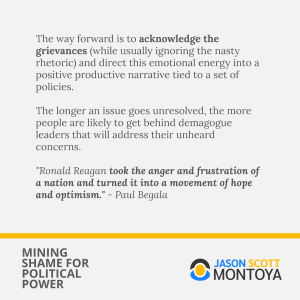
Demagogue Leaders Mine Shame To Grow Power & We Play A Part. Here's How We Can Fruitfully Channel Grievance
What if, by understanding the dynamics unfolding, we could play a part in overcoming our political polarization and calcification?
In a 2024 Election presentation by UCLA professor Lynn Vavreck, I recently learned about the work of Arlie Russell Hochschild who wrote the book, which I've not yet read, called Stolen Pride: Loss, Shame, & The Rise of the Right (affiliate link). In the book, Arlie shares about the Anti-Shame ritual that Trump and the media engage, in which gives Trump (and the media) more power, oftenp grounded in outrage.
Here's the problem and solution we'll be exploring in this blog post.
- Problem: We all play a role in the anti-shame ritual. In its worst manifestations, this ritual gives Demagogue leaders power.
- Solution: Ignore the offensive (usually), and focus on the root grievance. Direct that grievance into a redemptive narrative with practical actions for change.
Let's explore how this works.
Problem: The Anti-Shame Ritual
Rothschild says many people feel that their sense of community and local recognition (pride) has been lost. They were and are stuck, unable to make sense of their situation without a narrative. As described in this Time Magazine interview (How Trump Weaponized White Rural America’s Shame), I paraphrase Arlie in the following.
Trump comes along and provides a narrative. He says, it wasn't lost, rather they stole it from you. People go from feeling shame to having someone to blame. Trump leverages this dynamic. Here's how the 4 part anti-shame ritual unfolds.
“In Moment 1 Trump says something transgressive… When he announced his presidential bid in 2015 he declared, “when Mexico sends its people…they’re bringing drugs. They’re bringing crime. They’re rapists.”’
“In Moment 2, the punditry shames Trump, saying in essence, “You can’t say that! How disgraceful.” After Trump’s Mexican rapist remark, Macy’s announced that it would discontinue Trump’s menswear line. NBC—which hosted Celebrity Apprentice — announced it was severing ties “due to the recent derogatory statements by Donald Trump.” Univision revoked its promise to air Trump’s Miss America and Miss Universe contests.”
“In Moment 3, Trump turns to his followers saying in effect: They hurt me. I’m in pain, as you are. I’m suffering for you.”
“Then comes Moment 4, the most important: Trump roars back at the shamers. “If NBC is so weak and so foolish,” Trump said in 2015, “as to not understand the serious illegal immigration problem…” and he unleashed accusations against a variety of enemies—Macy’s, NBC, the “treasonous press,” the “deep state,” and the Democratic party—saying, in effect, I will protect you against these causes of your distress.”
This framework of grievance was an eye-opening insight providing me with part of the puzzle I was missing, and clarity for how we can make a positive societal impact going forward.
Trump taps into people's legitimate often neglected grievances. He does it in a vile way, so the media calls him out for his approach and he faces consequences for his words and actions. By being attacked, he becomes a victim. Supporters come to his aid and he gets sympathy from those who care about the issue, gaining loyalty out of the emotional bond created between him and his supporters.
Unfortunately, this means Trump steals the victim's victimhood status. The victims in the case of immigration are both Americans who want a safe world and instead end up on the other side of certain immigrant crime, and the immigrants — the group with the least amount of power in this dynamic — who are vulnerable foreigners who face their own set of risks and consequences. This is similar to abortion, how one political side takes the unborn as their victim and the other the mother when what we need is someone to take up both.
Trump, who is in an immense position of power, steals the victimhood from the actual victims and gets the sympathy of people who support him. He divides the two groups instead of bringing them together to solve both constituent's problems, exploiting his supporters by mining their shame for political power.
Solution: Acknowledge & Address the Root Problem
"Ronald Reagan took the anger and frustration of a nation and turned it into a movement of hope and optimism." - Paul Begala
The way forward is to acknowledge the grievances (while usually ignoring the nasty rhetoric) and direct this emotional energy into a positive productive narrative tied to a set of policies. Ideally, we are so proactive, that there is never an opportunity for the grievances to grow into a movement. This is the failure of American political leaders over the last several decades, in their failure to comprehensively address the problem. The longer an issue goes unresolved, the more people are likely to get behind demagogue leaders who will address their unheard concerns.
Seeing Deeeper
"And once [my son] knew I was listening to him, once he knew that his perspective was being heard, I could understand what the real problem was, that it was not you know, she got a cookie and I didn't get a cookie or whatever it was. It was like, he really feels like he is being overlooked in a number of situations. I could address that. And I was like, you're still in trouble. Like, I need you to understand from our perspective, this behavior is still not acceptable in this house. But let's talk about the thing that really matters to you." - Dr. Sara Musgrove, Design Thinking (Share Life Podcast)
I've often dealt with crude and crass people throughout my life, and it's easy to dismiss their grievances because of how horrible they act and speak. But, wisdom tells us to sometimes sidestep that wretched behavior and get to the root of the grievance so we can address it. Once addressed, it'll allow us to more effectively address the wretched behavior that was married with the grievance. Sometimes it'll be a messy of trying to address both at once.
So, going forward, I'll be thinking of ways to understand the root grievance and redirect the emotional energy towards a redemptive narrative with practical actions for addressing them.
Graphics For Sharing On Social Media
- Created on .
- Last updated on .
 This page is sponsored by
This page is sponsored by 









